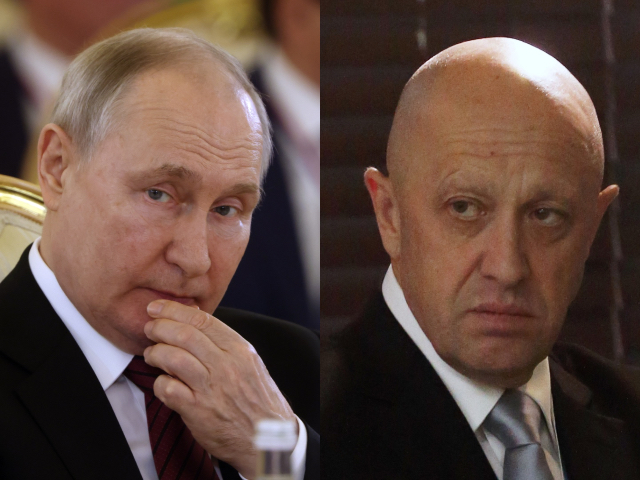Wagner’s Prigozhin Resurfaces: Moscow Mutiny a ‘Master Class’ on Invading Ukraine
Wagner Group leader Yevgeny Prigozhin on Monday morning issued his first statement since his aborted insurrection over the weekend.
In an 11-minute audio clip, Prigozhin said he had no intention of overthrowing Russian leader Vladimir Putin or toppling the entire Russian state but was only defending his Wagner mercenary organization against corrupt elements of the Russian military.
“We didn’t march to overthrow Russia’s leadership,” Prigozhin said. “The aim of the march was to avoid the destruction of Wagner and to hold to account the officials who, through their unprofessional actions, have committed a massive number of errors.”

Russian businessman Yevgeny Prigozhin attends the meeting with investors at the 2nd Eastern Economic Forum on September 2, 2016, in Vladivostok, Russia (Mikhail Svetlov/Getty Images) // Russian President Vladimir Putin is seen during the Supreme Economic Eurasian Council at the Grand Kremlin Palace on May 25, 2023, in Moscow, Russia (Contributor/Getty Images).
“We went to demonstrate our protest, and not to overthrow power in the country,” he insisted.
“We started our march because of an injustice,” he said. “We showed no aggression, but we were hit by missiles and helicopters. This was the trigger.”
Prigozhin said the injustice was an order by Russian Defense Minister Sergei Shoigu, whom he loathes, to dissolve all private military contractors (PMCs) active in Ukraine. According to Prigozhin, Shoigu decided to dissolve the Wagner Group himself by ordering a missile strike on one of its camps on Friday, killing about 30 Wagner mercenaries.
The Wagner leader proudly, and rather specifically, boasted that his forces did not kill any Russian soldiers “on the ground” during his 780-kilometer march to Moscow. Wagner forces unquestionably did kill some Russian pilots in the air, including the crews of at least six helicopters and possibly a fixed-wing airborne command post.
In the most cutting passage of his remarks, Prigozhin said Wagner’s march to Moscow covered the same distance Russian troops could have covered to take Kyiv on the first day of the war in Ukraine, if only Russia’s army were as well-trained and well-led as Wagner’s mercenaries.
“We showed a master-class on how February 24, 2022, had to look. We turned around to avoid spilling the blood of Russian soldiers. We regret that we had to hit Russian aviation,” he said.
Prigozhin added that his ability to move troops and armor so quickly across Russia, with minimal resistance, revealed “serious security problems across the entire country.”
Belarusian state media reported on Saturday that Prigozhin halted his push to Moscow because Belarusian dictator Alexander Lukashenko talked him out of it, offering him a deal that would keep Wagner intact and grant Prigozhin sanctuary in Belarus.
Ukrainian intelligence officials suggested on Sunday that Prigozhin was offered the resignation of Shoigu and other top Russian military officials as part of the deal that aborted his insurgency.
Shoigu made his own first appearance since the mutiny in a video released by the Russian Defense Ministry about the same time Prigozhin’s address was circulating on the encrypted Telegram messaging platform, which is his preferred means of communicating with his admirers and the media. The Shoigu video showed him visiting troops in Ukraine, implying he remains secure in his post, although it was unclear when the footage was recorded.
Another Russian military official heatedly criticized by Prigozhin, Chief of General Staff Gen. Valery Gerasimov, has not been seen in public since the weekend.
As for Putin, he issued his own first statement following the mutiny on Monday, but he did not mention it at all–instead, merely discussing an international forum for young engineers.
Prigozhin did not discuss the terms of his agreement with Lukashenko in his video message, outline any plans for the future of Wagner, or disclose his current location in his Monday morning video.
RELATED — Klobuchar: Russian Rebellion Shows ‘Crack in the Strength’ of Putin at Home





Comments are closed.